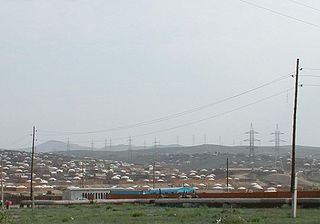
Ulaanbaatar, previously anglicized as Ulan Bator, is the capital and most populous city of Mongolia. It has a population of 1.6 million, and it is the coldest capital city in the world by average yearly temperature. The municipality is located in north central Mongolia at an elevation of about 1,300 metres (4,300 ft) in a valley on the Tuul River. The city was founded in 1639 as a nomadic Buddhist monastic centre, changing location 28 times, and was permanently settled at its modern location in 1778.
Articles related to Mongolia include:

Mongolia is divided into 21 provinces or aimags and one provincial municipality. Each aimag is subdivided into several districts. The modern provinces have been established since 1921. The capital, Ulaanbaatar, is governed as an independent provincial municipality separate from Töv Province, inside which it is situated.

Darkhan-Uul is one of the 21 aimags (provinces) of Mongolia. It is located in the northern part of the country.

Töv is one of the 21 aimags (provinces) of Mongolia. The national capital Ulaanbaatar is located roughly at its center, but the city itself is administered as an independent municipality.

Öndörkhaan, is a town in Mongolia located 290 km east of Ulaanbaatar. On November 18, 2013, the city was renamed to Chinggis City in honor of Genghis Khan, who was born and possibly buried in the same province north of the city. Öndörkhaan serves as the capital of the province Khentii Aimag.
The Khangai Mountains form a range in central Mongolia, some 400 km (250 mi) west of Ulaanbaatar.

Ulaankhus is a sum (district) of Bayan-Ölgii Province in western Mongolia. The seat of the district is Bilüü, situated 46 kilometres (29 mi) west of the city of Ölgii and 1,682 kilometres (1,045 mi) from the Mongolian capital of Ulaanbaatar. It is primarily inhabited by ethnic Kazakhs. As of 2014 it had a population of 8010 people.

A district, is a second level administrative subdivision of Mongolia. The 21 provinces of Mongolia are divided into 330 sum.

Ulaanbaatar is divided into nine düüregs or municipal districts: Baganuur, Bagakhangai, Bayangol, Bayanzürkh, Chingeltei, Khan Uul, Nalaikh, Songino Khairkhan and Sükhbaatar. Each district is subdivided into khoroos, of which there are 204. Each düüreg also serves as a constituency that elects one or more representatives into the State Great Khural, the national parliament.

The architecture of Mongolia is largely based on traditional dwellings, such as the yurt and the tent. During the 16th and 17th centuries, lamaseries were built throughout the country as temples which were later enlarged to accommodate a growing number of worshipers. Mongolian architects designed their temples with six and twelve angles and pyramidal roofs approximating the yurt's round shape. Further expansion led to a quadratic shape in the design of the temples, with roofs in the shape of pole marquees. Trellis walls, roof poles and layers of felt were eventually replaced by stone, brick beams and planks.

A Ger district is a form of residential district in Mongolian settlements. They usually consist of parcels with one or more detached traditional mobile dwellings or gers, surrounded by two-metre high wooden fences. In other countries, gers are known as yurts.
The history of Ulaanbaatar, the capital of Mongolia, dates to 1639 when it was first established as a moveable monastery.

Bandiin Dambiinyam was a Mongolian architect.

Khaan Quest is an annual military exercise held in Mongolia for a week in the summer. It brings together over a dozen foreign militaries to engage in the sharing of practices for multinational peacekeeping operations. In the exercise, personnel gain United Nations peacekeeper training as well as certification for support of peacekeeping operations. According to Mongolian Armed Forces Chief of Staff, Lieutenant General Tserendejidiin Byambajav, "Khaan Quest has become one of the signature training events for the participating nations and one of the biggest peacekeeping exercise in the world."

Batshugar Enkhbayar is a Mongolian banker and politician. Enkhbayar is a member of the State Great Khural, representing the Songino Khairkhan constituency since 2021. He is a member of the Mongolian People's Party.
The New Central Wastewater Treatment Plant is a wastewater treatment plant under construction in Songino Khairkhan District, Ulaanbaatar, Mongolia.
The Ulaanchuluut Landfill is a former landfill in Songino Khairkhan District, Ulaanbaatar, Mongolia.
The Tuul Highway is a planned highway in Ulaanbaatar, Mongolia.

















